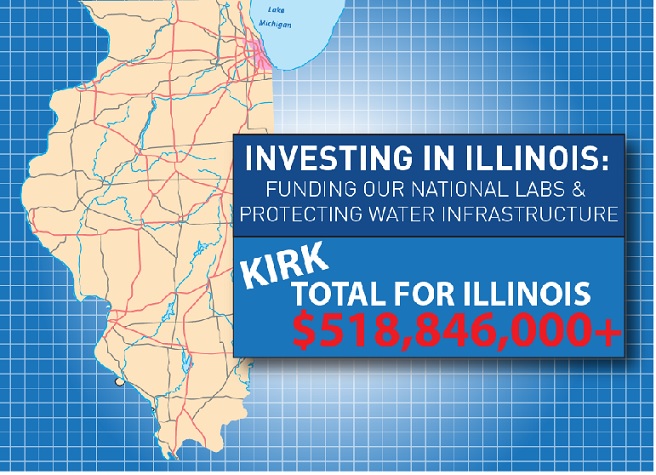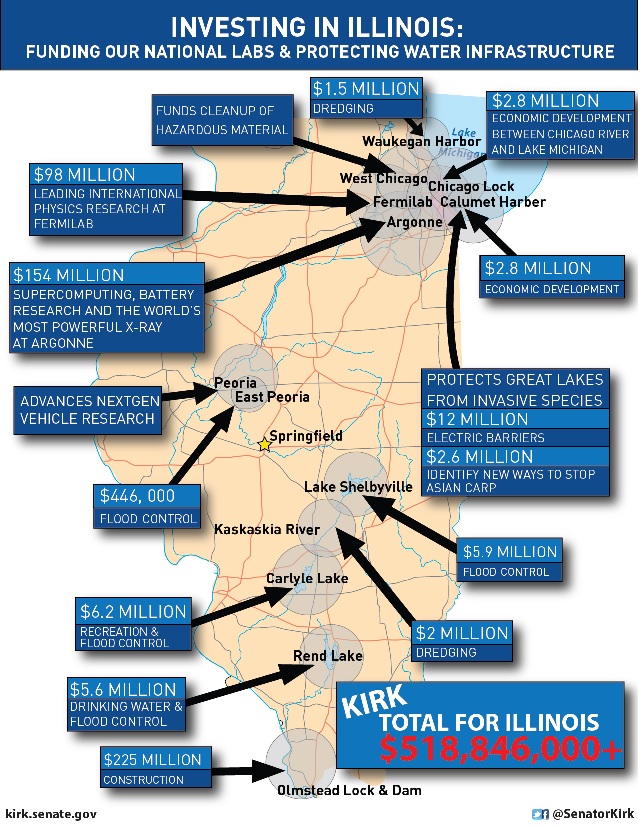Kirk Supports Investments in Illinois Innovation to Help Argonne, Fermilab Compete with China
Senate FY17 Energy & Water Bill Includes Kirk-Driven Provisions to Boosts Supercomputer Development, Strengthens Illinois Waterway Infrastructure; Bill Funds National Labs, Waterway Infrastructure, Cybersecurity Improvements
WASHINGTON – U.S. Senator Mark Kirk (R-Ill.) today supported legislation that boosts funding for cutting-edge research at National Laboratories, including Argonne and Fermilab in Illinois, and supports efforts to protect the Great Lakes from invasive species and improve navigation on Illinois’ rivers and lakes. As a member of the Senate Appropriations Committee, Senator Kirk secured critical investments in Illinois innovation and waterway infrastructure in the Energy and Water Development Appropriations bill for fiscal year (FY) 2017, which is expected to pass the Senate tomorrow.
“The Illinois economy is driven by our cutting-edge innovation, and this bill makes critical investments to make sure Argonne and Fermilab can outpace China in developing new technologies like the world’s fastest supercomputer and the most powerful X-ray microscope,” Senator Kirk said. “Our economy will also benefit from improved navigation on the Great Lakes and the Mississippi and Illinois Rivers so Illinois goods and agricultural products can be shipped more efficiently on our waterways to markets around the world.”
The Energy and Water Development Appropriations Act for FY2017:
- Boosts National Labs Funding for Fermilab and Argonne in Illinois. The bill funds the Department of Energy’s (DOE) Office of Science at a record level of $5.4 billion, supporting cutting-edge research and more than 5,000 employees at Argonne National Lab in Lemont and Fermi National Lab in Batavia. The funding supports Argonne’s “exascale” computing program to compete with China in developing computers that are 100 times faster than the world’s most powerful computers today; Argonne’s Advanced Photon Source to construct the world’s most powerful 3D X-ray microscope that will aid in developing innovative technologies; and Fermilab’s groundbreaking high energy physics research, which is key to ensuring American leadership in basic sciences.
- Protects Critical Energy Infrastructure Against Cyber Attacks. The bill provides more than $50 million to improve cybersecurity for Energy Delivery Systems and includes funding to develop cyber and cyber-physical solutions for power distribution and municipal utility companies.
- Protects the Great Lakes and Mississippi River from Invasive Species. The bill includes $12 million for full operational use of electric barriers in the Chicago Area Waterway System to stop the spread of Asian Carp into the Great Lakes. It also provides $2.6 million for the Army Corps of Engineers to conduct a study at Brandon Road Lock and Dam to identify new technologies to halt the transfer of Asian carp and other harmful species between the Great Lakes and Mississippi River.
- Supports Maintenance of Harbors, Locks and Dams on Illinois and Mississippi River Waterways. The bill restores $1.4 billion in cuts made by the president’s budget to the U.S. Army Corps of Engineers, providing the Corps a record $6 billion in funding. The bill provides $1.3 billion for the Harbor Maintenance Trust Fund (HMTF), or $120 million above the ambitious target authorized in the Water Resources Reform and Development Act of 2014. It also includes more than $1.5 million for dredging in Waukegan Harbor and fully utilizes the Inland Waterways Trust Fund to build and repair locks and dams. Additionally, the bill increases funds to operate and maintain Army Corps water resource projects nationwide, including Chicago Harbor, Calumet Harbor, Kaskaskia River, Shelbyville, Carlyle and Rend Lakes in Illinois.
- Funds Cleanup of Hazardous Material in West Chicago. The bill provides $30 million for DOE’s Title X Uranium and Thorium Reimbursement Program to aid the environmental cleanup of thorium in DuPage County at the old Kerr-McGee factory, a former atomic site that requires remediation to restore its full economic potential. These funds will provide a key first step toward allowing for long-overdue economic development in this community.
- Advances Next Generation Vehicle Technology to Keep Illinois Manufacturers Competitive. The bill includes $308 million for the DOE’s Vehicle Technologies office to improve automotive fuel economy, including the energy efficiency of heavy duty trucks, off-road vehicles, industrial mining, and farm equipment. Significant energy efficiency improvements by U.S. off-road vehicle manufacturers will reduce harmful emissions and ensure companies in Illinois like Caterpillar, Bosch, Navistar, Danfoss and Parker-Hannifin continue to lead the world in this sector.
Persuant to Senate Policy, petitions, opinion polls and unsolicited mass electronic communications cannot be initiated by this office for the 60-day period immediately before the date of a primary or general election. Subscribers currently receiving communications from this office who wish to unsubscribe may do so here






